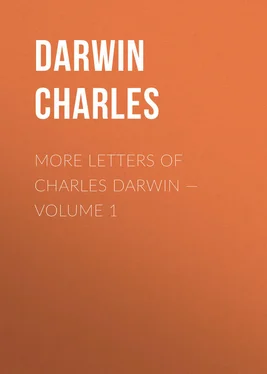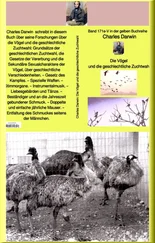Charles Darwin - More Letters of Charles Darwin — Volume 1
Здесь есть возможность читать онлайн «Charles Darwin - More Letters of Charles Darwin — Volume 1» — ознакомительный отрывок электронной книги совершенно бесплатно, а после прочтения отрывка купить полную версию. В некоторых случаях можно слушать аудио, скачать через торрент в формате fb2 и присутствует краткое содержание. Жанр: foreign_antique, foreign_prose, на английском языке. Описание произведения, (предисловие) а так же отзывы посетителей доступны на портале библиотеки ЛибКат.
- Название:More Letters of Charles Darwin — Volume 1
- Автор:
- Жанр:
- Год:неизвестен
- ISBN:нет данных
- Рейтинг книги:4 / 5. Голосов: 1
-
Избранное:Добавить в избранное
- Отзывы:
-
Ваша оценка:
- 80
- 1
- 2
- 3
- 4
- 5
More Letters of Charles Darwin — Volume 1: краткое содержание, описание и аннотация
Предлагаем к чтению аннотацию, описание, краткое содержание или предисловие (зависит от того, что написал сам автор книги «More Letters of Charles Darwin — Volume 1»). Если вы не нашли необходимую информацию о книге — напишите в комментариях, мы постараемся отыскать её.
More Letters of Charles Darwin — Volume 1 — читать онлайн ознакомительный отрывок
Ниже представлен текст книги, разбитый по страницам. Система сохранения места последней прочитанной страницы, позволяет с удобством читать онлайн бесплатно книгу «More Letters of Charles Darwin — Volume 1», без необходимости каждый раз заново искать на чём Вы остановились. Поставьте закладку, и сможете в любой момент перейти на страницу, на которой закончили чтение.
Интервал:
Закладка:
If you come to any more conclusions about polymorphism, I should be very glad to hear the result: it is delightful to have many points fermenting in one's brain, and your letters and conclusions always give one plenty of this same fermentation. I wish I could even make any return for all your facts, views, and suggestions.
LETTER 23. TO J.D. HOOKER.
(23/1. The following extract gives the germ of what developed into an interesting discussion in the "Origin" (Edition I., page 147). Darwin wrote, "I suspect also that some cases of compensation which have been advanced and likewise some other facts, may be merged under a more general principle: namely, that natural selection is continually trying to economise in every part of the organism." He speaks of the general belief of botanists in compensation, but does not quote any instances.)
{September 1846}.
Have you ever thought of G. St. Hilaire's "loi de balancement" (23/2. According to Darwin ("Variation of Animals and Plants," 2nd edition, II., page 335) the law of balancement was propounded by Goethe and Geoffroy Saint-Hilaire (1772-1844) nearly at the same time, but he gives no reference to the works of these authors. It appears, however, from his son Isidore's "Vie, Travaux etc., d'Etienne Geoffroy Saint-Hilaire," Paris 1847, page 214, that the law was given in his "Philosophie Anatomique," of which the first part was published in 1818. Darwin (ibid.) gives some instances of the law holding good in plants.), as applied to plants? I am well aware that some zoologists quite reject it, but it certainly appears to me that it often holds good with animals. You are no doubt aware of the kind of facts I refer to, such as great development of canines in the carnivora apparently causing a diminution — a compensation or balancement — in the small size of premolars, etc. I have incidentally noticed some analogous remarks on plants, but have never seen it discussed by botanists. Can you think of cases in any one species in genus, or genus in family, with certain parts extra developed, and some adjoining parts reduced? In varieties of the same species double flowers and large fruits seem something of this — want of pollen and of seeds balancing with the increased number of petals and development of fruit. I hope we shall see you here this autumn.
(24/1. In this year (1847) Darwin wrote a short review of Waterhouse's "Natural History of the Mammalia," of which the first volume had appeared. It was published in "The Annals and Magazine of Natural History," Volume XIX., page 53. The following sentence is the only one which shows even a trace of evolution: "whether we view classification as a mere contrivance to convey much information in a single word, or as something more than a memoria technica, and as connected with the laws of creation, we cannot doubt that where such important differences in the generative and cerebral systems, as distinguish the Marsupiata from the Placentata, run through two series of animals, they ought to be arranged under heads of equal value."
A characteristic remark occurs in reference to Geographical Distribution, "that noble subject of which we as yet but dimly see the full bearing."
The following letter seems to be of sufficient interest to be published in spite of the obscurities caused by the want of date. It seems to have been written after 1847, in which year a dispute involving Dr. King and several "arctic gentlemen" was carried on in the "Athenaeum." Mr. Darwin speaks of "Natural History Instructions for the present expedition." This may possibly refer to the "Admiralty Manual of Scientific Enquiry" (1849), for it is clear, from the prefatory memorandum of the Lords of the Admiralty, that they believed the manual would be of use in the forthcoming expeditions in search of Sir John Franklin.)
LETTER 24. TO E. CRESY.
(24/2. Mr. Cresy was, we believe, an architect: his friendship with Mr. Darwin dates from the settlement at Down.)
Down {after 1847}.
Although I have never particularly attended to the points in dispute between Dr. (Richard) King and the other Arctic gentlemen, yet I have carefully read all the articles in the "Athenaeum," and took from them much the same impression as you convey in your letter, for which I thank you. I believe that old sinner, Sir J. Barrow (24/3. Sir John Barrow, (1764-1848): Secretary to the Admiralty. has been at the bottom of all the money wasted over the naval expeditions. So strongly have I felt on this subject, that, when I was appointed on a committee for Nat. Hist. instructions for the present expedition, had I been able to attend I had resolved to express my opinion on the little advantage, comparatively to the expense, gained by them. There have been, I believe, from the beginning eighteen expeditions; this strikes me as monstrous, considering how little is known, for instance, on the interior of Australia. The country has paid dear for Sir John's hobbyhorse. I have very little doubt that Dr. King is quite right in the advantage of land expeditions as far as geography is concerned; and that is now the chief object. (24/4. This sentence would imply that Darwin thought it hopeless to rescue Sir J. Franklin's expedition. If so, the letter must be, at least, as late as 1850. If the eighteen expeditions mentioned above are "search expeditions," it would also bring the date of the letter to 1850.)
LETTER 25. TO RICHARD OWEN. Down {March 26th, 1848}.
My dear Owen
I do not know whether your MS. instructions are sent in; but even if they are not sent in, I daresay what I am going to write will be absolutely superfluous (25/1. The results of Mr. Darwin's experience given in the above letter were embodied by Prof. Owen in the section "On the Use of the Microscope on Board Ship," forming part of the article "Zoology" in the "Manual of Scientific Enquiry, Prepared for the Use of Her Majesty's Navy" (London, 1849).), but I have derived such infinitely great advantage from my new simple microscope, in comparison with the one which I used on board the "Beagle," and which was recommended to me by R. Brown ("Life and Letters," I., page 145.), that I cannot forego the mere chance of advantage of urging this on you. The leading point of difference consists simply in having the stage for saucers very large and fixed. Mine will hold a saucer three inches in inside diameter. I have never seen such a microscope as mine, though Chevalier's (from whose plan many points of mine are taken), of Paris, approaches it pretty closely. I fully appreciate the utter ABSURDITY of my giving you advice about means of dissecting; but I have appreciated myself the enormous disadvantage of having worked with a bad instrument, though thought a few years since the best. Please to observe that without you call especial attention to this point, those ignorant of Natural History will be sure to get one of the fiddling instruments sold in shops. If you thought fit, I would point out the differences, which, from my experience, make a useful microscope for the kind of dissection of the invertebrates which a person would be likely to attempt on board a vessel. But pray again believe that I feel the absurdity of this letter, and I write merely from the chance of yourself, possessing great skill and having worked with good instruments, {not being} possibly fully aware what an astonishing difference the kind of microscope makes for those who have not been trained in skill for dissection under water. When next I come to town (I was prevented last time by illness) I must call on you, and report, for my own satisfaction, a really (I think) curious point I have made out in my beloved barnacles. You cannot tell how much I enjoyed my talk with you here.
Ever, my dear Owen, Yours sincerely, C. DARWIN.
P.S. — If I do not hear, I shall understand that my letter is superfluous. Smith and Beck were so pleased with the simple microscope they made for me, that they have made another as a model. If you are consulted by any young naturalists, do recommend them to look at this. I really feel quite a personal gratitude to this form of microscope, and quite a hatred to my old one.
Читать дальшеИнтервал:
Закладка:
Похожие книги на «More Letters of Charles Darwin — Volume 1»
Представляем Вашему вниманию похожие книги на «More Letters of Charles Darwin — Volume 1» списком для выбора. Мы отобрали схожую по названию и смыслу литературу в надежде предоставить читателям больше вариантов отыскать новые, интересные, ещё непрочитанные произведения.
Обсуждение, отзывы о книге «More Letters of Charles Darwin — Volume 1» и просто собственные мнения читателей. Оставьте ваши комментарии, напишите, что Вы думаете о произведении, его смысле или главных героях. Укажите что конкретно понравилось, а что нет, и почему Вы так считаете.












